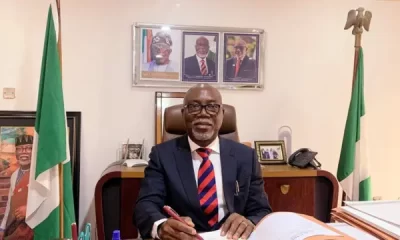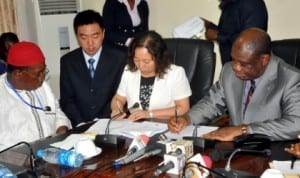Oil & Energy
When Will Nigerians Enjoy Stable Electricity?
Unarguably, the provi
sion of stable and uninterrupted power supply is key for accelerated economic and industrial development of any country. Analysts are quick to point out that Nigeria’s quest to become one of the 20th economies in the world may as well be a mirage without stable electricity supply.
They say that stable electricity supply will reduce the cost of manufacturing and services; boost investment and employment, among others.
However, in spite of its importance, efforts to guarantee sustainable stability in the power supply chain has remained elusive despite huge investments in the sector by successive administrations since independence.
For instance, available records showed that the Olusegun Obasanjo’s government spent over three billion dollars on its National Integrated Power Project (NIPP) as at 2007. This, according to Gov. Gabriel Suswam of Benue, the Chairman, Joint Transaction Technical Committee, is out of the over 10 billion dollars earmarked for the NIPP.
He said that the amount was also inclusive of the two billion dollars Federal Government’s counterpart funding for Mambilla Hydro Power project and the 1.4 billion dollars set aside for additional nine turbines plants.
At the moment, four of the projects which on completion would generate 4,774MW, had been completed, while six others are at 80 to 90 per cent completion.
To further boost the initiative, the President Goodluck Jonathan’s administration has strengthened the power sector reform by fully privatising the Power Holding Company of Nigeria (PHCN).
The exercise eventually resulted in the unbundling of the PHCN and the establishment of power Distributing Companies (DISCOs) across the country.
Although the reform is yet to significantly improve power stability nationwide, the World Bank, however, applauded the government for the initiative, with a call on other African countries to emulate the policy.
Mr Mukhtar Diop, the bank’s Vice President, Africa, made the commendation while listing some infrastructural achievements in Africa, during the recent African Union Summit on Financing Infrastructure Development, in Dakar, Senegal.
According to him, the power reform is one of the ways of solving Africa’s problems by Africans. “We must commend the leadership in Nigeria for the successful completion of the privatisation of the country’s power sector. “The electric reform in that country is one of the ways of solving Africa’s problems by Africans. We commend the country for that.”
It is, perhaps, against this backdrop, that President Goodluck Jonathan promised to restore uninterrupted power supply to Nigerians by the end of 2014.
Jonathan gave the assurance while commissioning the NIPP 500MW Omotosho II Power Station at Omotosho in Okitipupa Local Government Area of Ondo State.
He said that his optimism was based on the progress in the completion of the ongoing 10 independent power projects spread across the country.
“My administration is committed to boost electricity supply in the country. Today, we are in Ondo State to commission Omotosho Power Plant that will also serve the people of these areas and improve electricity supply in the country.”
But in spite of the government’s assurances, pundits doubt that uninterrupted and stable power supply to Nigerians would be achieved by the end of 2014.
Mr David Ladipo, whose company, Azura, is spending 700 million dollars to build a 450 MW plant in South Africa, insists that with the situation on ground, it will still take Nigeria 50 years from now to enjoy stable power supply.
Ladipo told Reuters news agency that Nigeria would need about 140,000MW to guarantee stable power supply.
‘’Nigeria is still scores of years away at this threshold. At present, it generates a meagre 4,000 MW for a population estimated at 170 million.
‘’South Africa, with a population of about 50 million people, produces about 40,000 MW of electricity and has been trying in recent years to increase output.
“It will probably take Nigeria another 50 years before it attains the same level of electricity consumption per capita as South Africa currently enjoys today,” Ladipo said.
However, Gov. Babatunde Fashola of Lagos State believes that with patience and commitment, Nigerians will soon enjoy the dividends of the ongoing power sector reforms.
Fashola expressed the optimism in Lagos at the closing ceremony of the 7th Lagos Economic Summit, tagged: Ehingbeti. According to him, the privatisation of the power sector will not be successful without the cooperation of investors and consumers.
He urged the public to develop energy conservation culture and manage existing power infrastructure adequately. “We should desist from illegal connections of electricity and ensure that our bills are paid appropriately.
“Electricity poles should not be used as speed breakers by reckless drivers; we should all protect the infrastructure from being damaged,’’ the governor said.
The Minister of Power, Prof. Chinedu Nebo, shares similar sentiments, noting that the Federal Government has concluded plans to explore ways of implementing the Indian power sector model in order to further boost the nation’s capacity to generate more power.
Nebo stated this recently in Abuja when he received a delegation on power from India.
The minister said that the Nigerian power sector which was still in a transitional stage after the privatisation still had a lot to learn from the Indian experience.
According to him, this is because of the peculiarity between both nations’ power sector. He said the ministry would soon summon a stakeholders’ forum of all Generating Companies (GENCOs), Distribution Companies (DISCOs) and the regulatory bodies to take a closer look on how India transformed its power sector.
Nebo also invited the Indian delegation to the first National Council on Power conference slated for August 2014 in order to have a robust discussion.
The minister assured the delegation that the Federal Government was committed to achieving 10,000 MW by the end of the year despite the challenges.
Speaking on behalf of the DISCOS, the Chief Executive Officer of Eko Disco, Mr Oladele Amoda, said the company had already had a technical arrangement with Tata of India.
He urged the India delegation to take seriously the issue of transfer of technology so as to fast-track the development of the sector.
The Indian High Commissioner to Nigeria, Mr Ajjampur Ghenashyam, who also spoke, advised Nigeria, as the hub of economic activities in the West African sub-region, to take the lead in the development of regional power market.
He said that India had achieved over 400 per cent leap in generation capacity in the last 10 years due to the competitiveness of the market.
Ghenashyam said countries like Nepal, Bangladesh, Bhutan and Pakistan had already been enjoying from seamless cross-border market and this had further boosted confidence for investment flow into the sector.
The envoy said that India was ready to partner with Nigeria in the development of the nation’s power sector.
Nonetheless, analysts have advised the government to also invest in the development of alternative sources of energy, such as wind and solar in order to boost the capacity of the country to meet its energy requirement.
They also advise the government to fast-track the completion of the NIPP projects in order to realise the objective of providing uninterrupted power supply to Nigerians by the end of 2014.
Mr Adamu,writes for News Agency of Nigeria (NAN).
Sani Adamu
Oil & Energy
Nigeria Loses More Crude Oil Than Some OPEC Members – Nwoko

Nigeria’s losses due to crude oil theft has been said to be more significant than those of some other members of the Organisation of Petroleum Exporting Countries(OPEC).
The Chairman, Senate Ad- hoc Committee on Crude Oil Theft, Senator Ned Nwoko, made this known in an interview with newsmen in Abuja.
Nwoko noted with dismay the detrimental impact of the issue, which, he said include economic damage, environmental destruction, and its impact on host communities.
According to him, the theft was not only weakening the Naira, but also depriving the nation of vital revenue needed for infrastructure, healthcare, education and social development.
The Senator representing Delta North Senatorial District described the scale of the theft as staggering, with reports indicating losses of over 200,000 barrels per day.
Nwoko disclosed that the ad hoc committee on Crude Oil Theft, which he chairs, recently had a two-day public hearing on the rampant theft of crude oil through illegal bunkering, pipeline vandalism, and the systemic gaps in the regulation and surveillance of the nation’s petroleum resources.
According to him, the public hearing was a pivotal step in addressing one of the most pressing challenges facing the nation.
‘’Nigeria loses billions of dollars annually to crude oil theft. This is severely undermining our economy, weakening the Naira and depriving the nation of vital revenue needed for infrastructure, healthcare, education, and social development.
‘’The scale of this theft is staggering, with reports indicating losses of over 200,000 barrels per day more than some OPEC member nations produce.
‘’This criminal enterprise fuels corruption, funds illegal activities and devastates our environment through spills and pollution.
‘’The public hearing was not just another talk shop; it was a decisive platform to uncover the root causes of crude oil theft, bunkering and pipeline vandalism.
‘’It was a platform to evaluate the effectiveness of existing surveillance, monitoring, and enforcement mechanisms; Identify regulatory and legislative gaps that enable these crimes to thrive.
‘’It was also to engage stakeholders, security agencies, host communities, oil companies, regulators, and experts to proffer actionable solutions; and strengthen legal frameworks to ensure stricter penalties and more efficient prosecution of offenders”, he said.
Nwoko noted that Nigeria’s survival depended
Oil & Energy
Tap Into Offshore Oil, Gas Opportunities, SNEPCO Urges Companies

Shell Nigeria Exploration and Production Company Ltd. (SNEPCo) has called on Nigerian companies to position themselves strategically to take full advantage of the growing opportunities in upcoming offshore and shallow water oil and gas projects.
The Managing Director, SNEPCO, Ronald Adams, made the call at the 5th Nigerian Oil and Gas Opportunity Fair (NOGOF) Conference, held in Yenagoa, Bayelsa State, last Thursday.
Adams highlighted the major projects, including Bonga Southwest Aparo, Bonga North, and the Bonga Main Life Extension, as key areas where Nigerian businesses can grow their capacity and increase their involvement.
“Shell Nigeria Exploration and Production Company Ltd. (SNEPCo) says Nigerian companies have a lot to benefit if they are prepared to take advantage of more opportunities in its offshore and shallow water oil and gas projects.
“Projects such as Bonga Southwest Aparo, Bonga North and Bonga Main Life Extension could grow Nigerian businesses and improve their expertise if they applied themselves seriously to executing higher value contracts”, Adams stated.
Adams noted that SNEPCo pioneered Nigeria’s deepwater oil exploration with the Bonga development and has since played a key role in growing local industry capacity.
He emphasized that Nigerian businesses could expand in key areas like logistics, drilling, and the construction of vital equipment such as subsea systems, mooring units, and gas processing facilities.
The SNEPCO boss explained that since production began at the Bonga field in 2005, SNEPCo has worked closely with Nigerian contractors to build systems and develop a skilled workforce capable of delivering projects safely, on time, and within budget both in Nigeria and across West Africa.
According to him, this long-term support has enabled local firms to take on key roles in managing the Bonga Floating, Production, Storage and Offloading (FPSO) vessel, which reached a major milestone by producing its one-billion barrel of oil on February 3, 2023.
Oil & Energy
Administrator Assures Community Of Improved Power Supply

The Emohua Local Government Area Administrator, Franklin Ajinwo, has pledged to improve electricity distribution in Oduoha Ogbakiri and its environs.
Ajinwo made the pledge recently while playing host in a courtesy visit to the Oduoha Ogbakiri Wezina Council of Chiefs, in his office in Rumuakunde.
He stated that arrangements are underway to enhance available power, reduce frequent outages, and promote steady electricity supply.
The move, he said, was aimed at boosting small and medium-scale businesses in the area.
“The essence of power is not just to have light at night. It’s for those who can use it to enhance their businesses”, he said.
The Administrator, who commended the peaceful nature of Ogbakiri people, urged the Chiefs to continue in promoting peace and stability, saying “meaningful development can only thrive in a peaceful environment”.
He also charged the Chiefs to protect existing infrastructure while promising to address the challenges faced by the community.
Earlier, the Oduoha Ogbakiri Wezina Council of Chiefs, led by HRH Eze Goodluck Mekwa Eleni Ekenta XV, expressed gratitude to the Administrator over his appointment and pledged their support to his administration.
The chiefs highlighted challenges facing the community to include incessant power outage, need for new transformers, and the completion of Community Secondary School, Oduoha.
The visit underscored the community’s expectations from the LGA administration.
With Ajinwo’s assurance of enhancing electricity distribution and promoting development, the people of Oduoha Ogbakiri said they look forward to a brighter future.
By: King Onunwor
-
Politics3 days ago
Anambra Guber: INEC Releases Final List Of Candidates
-
Sports3 days ago
ICC Nominates Nigeria For Women’s Cricket Award
-
Niger Delta3 days ago
Delta APC Reaffirms Support For Oborevwori’s Administration
-

 Featured3 days ago
Featured3 days agoTight Security As Muslims Celebrate Eid-el-Kabir, Today
-

 Politics3 days ago
Politics3 days agoTribunal Dismisses PDP, Others’ Petitions Against Aiyedatiwa’s Election
-

 Politics3 days ago
Politics3 days agoDSS Seeks Court Injunction Against Publicity For Utomi’s Shadow Govt
-
Sports3 days ago
Tinubu Assures Kano Crash Survivors Of Rehabilitation
-
Rivers3 days ago
LG Administrator Commits To Completing Ongoing Projecrs … Urges Students Of The LGA To Be Focused


